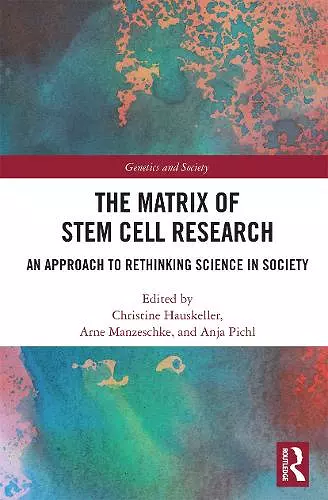The Matrix of Stem Cell Research
An Approach to Rethinking Science in Society
Arne Manzeschke editor Christine Hauskeller editor Anja Pichl editor
Format:Paperback
Publisher:Taylor & Francis Ltd
Published:31st Mar '21
Currently unavailable, and unfortunately no date known when it will be back
This paperback is available in another edition too:
- Hardback£145.00(9781138098527)

Stem cell research has been a problematic endeavour. For the past twenty years it has attracted moral controversies in both the public and the professional sphere. The research involves not only laboratories, clinics and people, but ethics, industries, jurisprudence, and markets. Today it contributes to the development of new therapies and affects increasingly many social arenas. The matrix approach introduced in this book offers a new understanding of this science in its relation to society. The contributions are multidisciplinary and intersectional, illustrating how agency and influence between science and society go both ways.
Conceptually, this volume presents a situated and reflexive approach for philosophy and sociology of the life sciences. The practices that are part of stem cell research are dispersed, and the concepts that tie them together are tenuous; there are persistent problems with the validation of findings, and the ontology of the stem cell is elusive. The array of applications shapes a growing bioeconomy that is dependent on patient donations of tissues and embryos, consumers, and industrial support. In this volume it is argued that this research now denotes not a specific field but a flexible web of intersecting practices, discourses, and agencies. To capture significant parts of this complex reality, this book presents recent findings from researchers, who have studied in-depth aspects of this matrix of stem cell research.
This volume presents state-of-the-art examinations from senior and junior scholars in disciplines from humanities and laboratory research to various social sciences, highlighting particular normative and epistemological intersections. The book will appeal to scholars as well as wider audiences interested in developments in life science and society interactions. The novel matrix approach and the accessible case studies make this an excellent resource for science and society courses.
"A scholarly, and profoundly interdisciplinary, approach to stem cell research that stands the conventional model of scientific development on its head. Far from offering only a secondary and peripheral commentary on more technical matters, questions of ethics, epistemology and socio-technical process are given proper significance. Cells and clinical practices, philosophy and social science flow together in this fascinating and very timely collection. As the editors convincingly argue, the social sciences and humanities do not simply study stem cell research. They also help configure it."
Alan Irwin, Professor in the Department of Organization, Copenhagen Business School, Denmark
"Reducing stem cell research to issues of the moral status of embryos is not grasping its dimensions. This excellent interdisciplinary book highlights the central roles epistemic, social, ethical and political factors play in its formation and recent developments. An essential work for all who want to understand this life science in its societal complexity."
Ilhan Ilkilic, Professor of Health Sciences, Istanbul University, and Member of the German Ethics Council
"I think it is a most interesting book, providing new, innovative and very important perspective at stem cell research/science. It provides a panoramic account of the forces at play in its constitution: disciplines, techniques, specialties, commercial interests, medical concerns, ethical and political factors and more. It does so stressing complementarities and diversity in the dynamics of this wide variety of factors, without privileging one set of factors over another. A non-reductionist, comprehensive understanding of the development of contemporary science, and medical science in particular requires such a broad grasp."
Rob Hagendijk, Professor of STS, University of Amsterdam, The Netherlands
ISBN: 9780367726836
Dimensions: unknown
Weight: 453g
232 pages